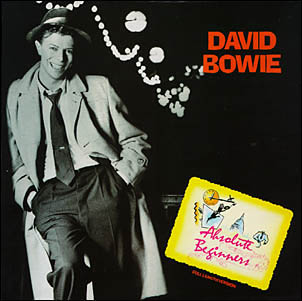Whilst perhaps not a Bowie fanatic per se, I am a big fan and ardent admirer, and was lucky enough to see the man himself play live at the Liverpool Royal Court in 1997. Even so, I did not expect the wave of melancholy and loss that came over me this week; no tears, but a real sense of lament; a sense that something has changed.
Many of us have reached for and sought solace in Bowie tracks this week. Some have gone for the better known classics, some for the earlier or later, more obscure tracks. Some, like my good friend and blogger Tim Worthington, went straight for the underrated Tin Machine.
All good, valid options. But despite my love of the many different phases of Bowie, there was only one track for me: the sublime Absolute Beginners.
Written by Bowie for the much-hyped 1986 film musical of the same name, Absolute Beginners was a contemporary record which evoked the 1950s period, even if it didn't sound like a 1950s record. Bowie combines a retro 1950s sound with the 80s pop-jazz sound to create a heartfelt, irresistible anthemic ballad which manages to balance optimism and melancholy.
The track was co-produced by Bowie with Clive Langer & Alan Winstanley, who masterminded the entire film soundtrack album. Langer & Winstanley's production partnership is probably most linked to their work with Madness, and interestingly enough, there is something of the mid-80s downbeat Madness sound to the track. Indeed, it's a shame that there were no further collaborations between Bowie and Langer & Winstanley beyond this track and That's Motivation (also featured in the film).
It's a lush, real-sounding record; with a real cinematic sweep, even when considered separately from the film. Kicking off with a “ba-ba-bow-woo” vocal hook, and carried along with some irresistable saxophone, the song simply screams class. Bass, percussion and piano all add to the jazz vibe, giving a very different but complementary environment for Bowie's unmistakable voice. “I've nothing much to offer / I've nothing much to take” he opines, before heading to the bridge which contains the song's title (as opposed to the more standard practice of using it in the chorus).
The chorus is a shaft of sunlight between the clouds, a blast of optimism which deviates from the considered melancholy of the verses. "If our love song / Could fly over mountains / Sail over heartaches / Just like the films / There's no reason / To feel all the hard times / To lay down the hard lines / It's absolutely true".
Eventually, Bowie builds up to one last cry of the chorus – “It's absolutely true...” – and then gives way for the players, who take charge of a lengthy coda, which is heartbreakingly, spine-tinglingly moving, you never want it to end.
The musicianship and playing on the track is astonishing -- the band includes Rick Wakeman on piano, whilst Luis Jardim contributes percussion -- and the instrumental Dub Mix of the track shows this off to great effect.
There were three versions of Absolute Beginners released; the 7" version, which comes in at a surprising 5 and a half minutes; the eight-minute Full Length Version, and a Dub Mix (an instrumental version of the Full Length Mix). All are worth a listen -- repeated listens, in fact -- though the Full Length Version is the definitive take. Don't dismiss it as a standard 80's 12" mix, padded out to fill one side of vinyl -- this is a sumptuous, lush performance; it's as heartbreaking as it is inspiring.
Artistically and commercially, Bowie's song outperforms and transcends the parent film; a number #2 hit in the UK charts, it's also considered as one of his best 1980s tracks. But a word for the film too -- much-hyped, underperformed at the box office and largely derided it may have been, but I think Absolute Beginners does not deserve the bad rap it has gained over the years.
As someone who has read Colin MacInnes' original novel and seen the film many times, it is clear that the film is a heightened, authored take on the source material, rather than a faithful adaptation. True, it may not gel properly as a cohesive whole and some of the performances let it down, but its sheer ambition and breathtaking set-pieces deserve some praise. The opening motion shot of 1950s Soho is terrific, as is Bowie's electrifying performance of That's Motivation as he stands on the keys of a giant typewriter!
That's one of my favourite images of Bowie. Larger than life, even when dwarfed by a giant typewriter.
Absolute Beginners is an interesting film, but the title track carries so much meaning for me on many levels. I never get tired of it, but I'm always careful not to overplay it, not let it overstay it's welcome. Some things should be treasured, after all.
Unquestionably one of my favourite records, and yet another example of the diversity of the genius that is, was, and will always be, David Bowie.


It's one of my favourite Bowie songs with particular reference to my life in 1986. Thanks for reminding me. Great post.
ReplyDelete